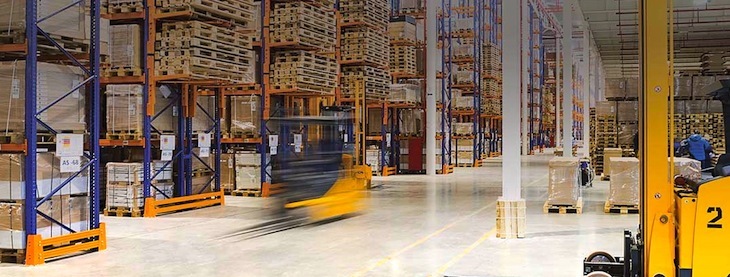LTL freight demand surges, tough negotiations underway at ABF Freight
by January 8, 2018 4:17 pm 1,904 views

An ArcBest logistics operation.
Demand for less-than-truckload (LTL) carriers continued to rise in the fourth quarter as freight demand from traditional LTL markets and truckload spillover increased and pricing trends accelerated, but difficult negotiations with a labor union led a transportation analyst to downgrade shares of Fort Smith-based ArcBest to sell.
“We believe the upward trends in crude and retail fuel prices should bode well for the group not only from an industrial end market perspective, but also because of the favorable impact on fuel surcharge programs across the LTLs,” said Brad Delco, trucking/transportation analyst for Little Rock-based Stephens Inc.
However, in a company update, Stifel analyst David Ross downgraded ArcBest to sell as its subsidiary, LTL carrier ABF Freight, faces negotiations with labor union Teamsters. While the LTL industry has been strong, ABF Freight has a competitive disadvantage because of its union labor force, Ross said. It’s the main reason for its below-average margins but not the only one: The company also isn’t pricing properly.
“Moreover, ABF’s current Teamsters contract expires March 31, 2018, and we do not believe the company is in a good negotiating position with a healthy balance sheet in a strong freight market,” Ross said. “This should come more into focus as we move through (the first quarter of 2018) and closer to the expiration (potential strike) with no deal signed. We are sellers of the shares into the March 31 deadline, as we believe the company will not get further concessions and may have to grant significant increases to ‘make-up’ for wages taken away in 2013.”
In 2013, the Teamsters agreed to a 7% wage reduction along with other work rule changes expected to benefit ABF, Ross said. In exchange, workers would receive the pay cut at least partially returned as bonuses once the company reached operating ratio targets of less than 96%. In the third quarter of 2017, the company’s operating ratio was 95.8%, and Ross expects the ratio to rise to 97.7% in the fourth quarter and complete the year at that level. If the estimate holds, ABF would not have had a year with an operating ratio of less than 96% since the agreement. Operating ratio is a company’s operating expenses as a percentage of revenue.
Although Ross downgraded the stock to sell, he increased ArcBest’s 12-month target price by $5 to $32, and the earnings per share estimate by 3 cents to $1.18 for 2017 and by 4 cents to $1.87 for 2018.
“Finding enough growth in the non-asset-based services to drive (earnings per share) will be a challenge,” he said. “In (the fourth quarter of 2016), the company announced that it would merge several business units under the ArcBest brand, which was expected to bring about ($15 million) or (35 cents per share) in annual savings, but we are unsure those savings have materialized as advertised.”
The company needs to focus on improving ABF’s operating ratio, which is a result of its increased focus on yield as it takes on more residential business, Ross said. The cubic minimum charge that was established Aug. 1 is expected to help, but it’s uncertain by how much.
POSSIBLE PENSION REFORM
“One risk to our sell thesis is the passing of pension reform legislation that removes significant liabilities from the company’s balance sheet and expenses from its income statement,” Ross noted. “ABF’s participation in multi-employer pension plans has left them at a significant cost disadvantage vs. peers.”
However, no reform proposal is on the table.
“Another risk is that the labor contract is signed sooner and on better terms than we expect. Third is that the company simply operates much better than expected.”
Delco, who maintains a hold rating for ArcBest, increased the estimated earnings per share price for the company by 3 cents to 40 cents for the fourth quarter of 2017. The change reflects the positive tonnage and yield updates through November and the continued truckload spillover that’s expected to continue in December as a result of a tight truckload market. Delco also increased 2018 and 2019 earnings per share estimates to $2.40, from $1.70, and $2.70, from $2.10, respectively, partly because of tax reform. He expects the company’s tax rate to fall 12 percentage points to 29% in 2018 and 28.5% in 2019.
ArcBest’s fourth-quarter earnings are expected to increase by 7 cents to 36 cents per share, from the same quarter in 2016, based on a consensus of 11 analysts. Revenue is projected to rise 5.1% to $723.24 million, based on a consensus of six analysts. The company has yet to announce when it will release fourth-quarter earnings, but it announced fourth-quarter earnings for 2016 on Feb. 8, 2017.
Shares of ArcBest (NASDAQ: ARCB) closed Monday (Jan. 8) at $36.35, up 20 cents. In the past 52 weeks, shares, of the company have ranged between $38.75 and $16.95. The company reached its 52-week high on Dec. 12.
BROADER TRENDS
In an LTL industry update, Ross said carriers were receiving average increases of between 4% and 5% in contract renewals in the fourth quarter. But in some cases, shippers have accepted between 20% and 40% rate increases as they were far below market rate.
As a whole, the LTL industry isn’t expected to expand its facilities or to see new companies join.
“We have not seen a significant LTL carrier enter the market since the early 1990s, and when carriers are looking for industrial dock space near population centers, they are now competing with Amazon and many industrial REITs for the limited properties available,” Ross said. “The industry’s long-term capacity constraint is the (number) of dock doors, so the companies that can add facilities and grow facilities will be able to handle more volume. And those who can’t should just end up ‘upgrading’ their freight mix and run a nice free cash flow generating business.”
